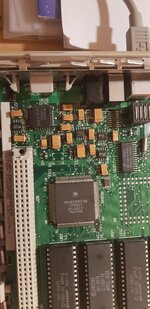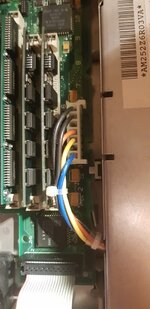Well that could be interesting: I could read all 4 chips, merged the binary code to one file and compared it to the LC-II.rom file, which is available under
https://github.com/macmade/Macintosh-ROMs/blob/main/LC-II.ROM
I have found numerous differing bytes, which are all originating from the same ROM chip (interestingly that's not the chip I accused to be damaged):
diff at byte 1829 (341-0476.bin)
diff at byte 2341 (341-0476.bin)
diff at byte 2853 (341-0476.bin)
diff at byte 2861 (341-0476.bin)
diff at byte 4397 (341-0476.bin)
diff at byte 5421 (341-0476.bin)
diff at byte 5925 (341-0476.bin)
diff at byte 5933 (341-0476.bin)
diff at byte 6445 (341-0476.bin)
diff at byte 6957 (341-0476.bin)
diff at byte 7461 (341-0476.bin)
diff at byte 7469 (341-0476.bin)
diff at byte 7981 (341-0476.bin)
diff at byte 8493 (341-0476.bin)
diff at byte 9509 (341-0476.bin)
diff at byte 10541 (341-0476.bin)
diff at byte 11053 (341-0476.bin)
diff at byte 11557 (341-0476.bin)
diff at byte 12069 (341-0476.bin)
diff at byte 12077 (341-0476.bin)
diff at byte 12581 (341-0476.bin)
diff at byte 13613 (341-0476.bin)
diff at byte 14117 (341-0476.bin)
diff at byte 15653 (341-0476.bin)
diff at byte 15661 (341-0476.bin)
diff at byte 16165 (341-0476.bin)
diff at byte 16173 (341-0476.bin)
diff at byte 19757 (341-0476.bin)
diff at byte 20261 (341-0476.bin)
diff at byte 20773 (341-0476.bin)
diff at byte 20781 (341-0476.bin)
diff at byte 21285 (341-0476.bin)
diff at byte 21293 (341-0476.bin)
diff at byte 22309 (341-0476.bin)
diff at byte 22829 (341-0476.bin)
diff at byte 23333 (341-0476.bin)
diff at byte 24869 (341-0476.bin)
diff at byte 25381 (341-0476.bin)
diff at byte 26925 (341-0476.bin)
diff at byte 27941 (341-0476.bin)
diff at byte 28461 (341-0476.bin)
diff at byte 28965 (341-0476.bin)
diff at byte 28973 (341-0476.bin)
diff at byte 29477 (341-0476.bin)
diff at byte 29485 (341-0476.bin)
diff at byte 31525 (341-0476.bin)
diff at byte 31533 (341-0476.bin)
diff at byte 32045 (341-0476.bin)
diff at byte 32549 (341-0476.bin)
diff at byte 32557 (341-0476.bin)
diff at byte 33061 (341-0476.bin)
diff at byte 35629 (341-0476.bin)
diff at byte 36141 (341-0476.bin)
diff at byte 36645 (341-0476.bin)
diff at byte 36653 (341-0476.bin)
diff at byte 38701 (341-0476.bin)
diff at byte 39205 (341-0476.bin)
diff at byte 39717 (341-0476.bin)
diff at byte 40229 (341-0476.bin)
diff at byte 41261 (341-0476.bin)
diff at byte 41765 (341-0476.bin)
diff at byte 42277 (341-0476.bin)
diff at byte 42797 (341-0476.bin)
diff at byte 45861 (341-0476.bin)
diff at byte 45869 (341-0476.bin)
diff at byte 47397 (341-0476.bin)
diff at byte 47405 (341-0476.bin)
diff at byte 48429 (341-0476.bin)
diff at byte 49445 (341-0476.bin)
diff at byte 50477 (341-0476.bin)
diff at byte 50981 (341-0476.bin)
diff at byte 50989 (341-0476.bin)
diff at byte 51493 (341-0476.bin)
diff at byte 51501 (341-0476.bin)
diff at byte 53029 (341-0476.bin)
diff at byte 53037 (341-0476.bin)
diff at byte 53541 (341-0476.bin)
diff at byte 54053 (341-0476.bin)
diff at byte 54565 (341-0476.bin)
diff at byte 54573 (341-0476.bin)
diff at byte 55077 (341-0476.bin)
diff at byte 56101 (341-0476.bin)
diff at byte 56613 (341-0476.bin)
diff at byte 60197 (341-0476.bin)
diff at byte 60205 (341-0476.bin)
diff at byte 61221 (341-0476.bin)
diff at byte 61229 (341-0476.bin)
diff at byte 61733 (341-0476.bin)
diff at byte 61741 (341-0476.bin)
diff at byte 62245 (341-0476.bin)
diff at byte 62253 (341-0476.bin)
diff at byte 62765 (341-0476.bin)
diff at byte 63269 (341-0476.bin)
diff at byte 64301 (341-0476.bin)
diff at byte 64805 (341-0476.bin)
diff at byte 64813 (341-0476.bin)
diff at byte 65317 (341-0476.bin)
diff at byte 65325 (341-0476.bin)
diff at byte 65829 (341-0476.bin)
diff at byte 66341 (341-0476.bin)
diff at byte 66853 (341-0476.bin)
diff at byte 66861 (341-0476.bin)
diff at byte 67365 (341-0476.bin)
diff at byte 68389 (341-0476.bin)
diff at byte 68397 (341-0476.bin)
diff at byte 68909 (341-0476.bin)
diff at byte 69925 (341-0476.bin)
diff at byte 69933 (341-0476.bin)
diff at byte 71973 (341-0476.bin)
diff at byte 72997 (341-0476.bin)
diff at byte 73517 (341-0476.bin)
diff at byte 74021 (341-0476.bin)
diff at byte 74533 (341-0476.bin)
diff at byte 75565 (341-0476.bin)
diff at byte 76077 (341-0476.bin)
diff at byte 78117 (341-0476.bin)
diff at byte 78629 (341-0476.bin)
diff at byte 79141 (341-0476.bin)
diff at byte 79149 (341-0476.bin)
diff at byte 80165 (341-0476.bin)
diff at byte 81189 (341-0476.bin)
diff at byte 81701 (341-0476.bin)
diff at byte 81709 (341-0476.bin)
diff at byte 83237 (341-0476.bin)
diff at byte 84261 (341-0476.bin)
diff at byte 84269 (341-0476.bin)
diff at byte 85293 (341-0476.bin)
diff at byte 86821 (341-0476.bin)
diff at byte 86829 (341-0476.bin)
diff at byte 87333 (341-0476.bin)
diff at byte 88869 (341-0476.bin)
diff at byte 89901 (341-0476.bin)
diff at byte 90917 (341-0476.bin)
diff at byte 90925 (341-0476.bin)
diff at byte 91429 (341-0476.bin)
diff at byte 92453 (341-0476.bin)
diff at byte 92973 (341-0476.bin)
diff at byte 94501 (341-0476.bin)
diff at byte 94509 (341-0476.bin)
diff at byte 96045 (341-0476.bin)
diff at byte 96557 (341-0476.bin)
diff at byte 97581 (341-0476.bin)
diff at byte 98085 (341-0476.bin)
diff at byte 98093 (341-0476.bin)
diff at byte 98605 (341-0476.bin)
diff at byte 99109 (341-0476.bin)
diff at byte 100141 (341-0476.bin)
diff at byte 102189 (341-0476.bin)
diff at byte 102693 (341-0476.bin)
diff at byte 102701 (341-0476.bin)
diff at byte 103205 (341-0476.bin)
diff at byte 103717 (341-0476.bin)
diff at byte 104237 (341-0476.bin)
diff at byte 105253 (341-0476.bin)
diff at byte 105765 (341-0476.bin)
diff at byte 106277 (341-0476.bin)
diff at byte 107301 (341-0476.bin)
diff at byte 107309 (341-0476.bin)
diff at byte 107821 (341-0476.bin)
diff at byte 108325 (341-0476.bin)
diff at byte 109861 (341-0476.bin)
diff at byte 110373 (341-0476.bin)
diff at byte 110381 (341-0476.bin)
diff at byte 111397 (341-0476.bin)
diff at byte 111909 (341-0476.bin)
diff at byte 112421 (341-0476.bin)
diff at byte 112429 (341-0476.bin)
diff at byte 113445 (341-0476.bin)
diff at byte 113957 (341-0476.bin)
diff at byte 114989 (341-0476.bin)
diff at byte 115493 (341-0476.bin)
diff at byte 116005 (341-0476.bin)
diff at byte 117029 (341-0476.bin)
diff at byte 118061 (341-0476.bin)
diff at byte 119085 (341-0476.bin)


